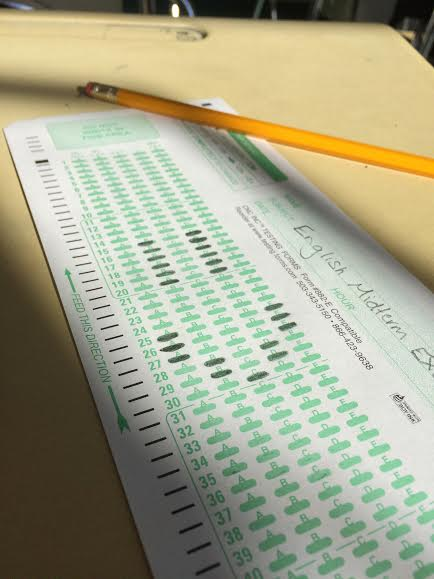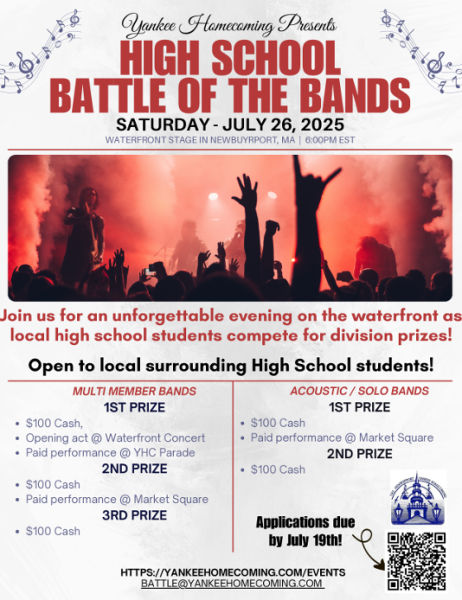Wait…No Midterms?!?!
It all started with a petition…
When Seniors Laura Hardenstine, Kelly Murray, Maddie Nelson, and Rachel Thibeau discovered the annual junior year Habits of Learning (HOL) presentations would be replaced by final exams last spring, they quickly gathered students in protest.
“It all began because HOL was always a thing for juniors,” said Senior Maddie Nelson. “We thought it was unfair we had to test more.”
“We didn’t like the idea of a creative project being replaced by another test,” agreed Rachel Thibeau, who, with the assistance of other students in her AP Humanities class, created a petition to reinstate HOL presentations.
Soon enough, the petition displayed the signatures of the majority of the Class of 2016. With support from their peers, the four students set up a meeting with Principal Seymour.
While Mr. Seymour revealed to the four juniors that it would be too late in the semester to begin a HOL presentation, he expressed a willingness to create reform. “He told us he liked the idea of a senior project and wanted to work with us to create one,” said Thibeau.
After taking summer vacation to recuperate from the strain of taking final exams at the end of an already laborious junior year, Hardenstine, Murray, Nelson, and Thibeau returned to Pentucket, now as seniors, with a renewed desire for change. This continued desire to incorporate some sort of creative project led to yet another meeting with Mr. Seymour, but this time, the meeting focused on senior midterm exams and enlisted the help of English department head Dr. Ruland and history department head Mr. Stevens.
The four students had remembered the success of Dr. Ruland and Mr. Stevens’ combined AP Humanities final project from a few months back. “We spent a lot of time working with Mr. Seymour figuring out what to do,” said Kelly Murray. When faced with the challenge of creating a brand new midterm project, Murray and her counterparts looked to the AP Humanities multi-genre final project as a model.
“It involved a lot of compromise,” Murray said of the process of deciding on specific aspects and time commitments involved. “I wanted a project people would be excited about.”
The goal of the project is very abstract and is designed to take students out of their comfort zone and reflect upon their personal growth as well as academic achievements. Last week, the midterm reform proponents passed out a handout, designed by Dr. Ruland, that detailed the expectations of the midterm project. This handout clearly states the “Essential Question” of the project, asking students, “How have your experiences over the last four years helped to prepare you for your future?”
To clarify the requirements for the project, Thibeau said, “We encourage students to focus on ‘their story’ which is, where they’ve come from, where they are, and where they’re going.” Students have the opportunity to address anything in their project from how their hobbies and interests have changed throughout their four years in high school, to how they have grown as students in the classroom. “We want to see growth, but not just academic growth,” adds Thibeau.
Further emphasizing student growth, Nelson advises students to incorporate in their project, “what has made them who they are today, what they like to do, and what will help their future from what they have learned in and out of school.” Nelson also hopes that the midterm project encourages students to include “a lot of different parts of [their] lives incorporated together.”
The Logistics.
Like the HOL presentations, this midterm project will be graded pass or fail and will be in place of exams. However, Thibeau encourages students to remember that this project does not take the place of final exams. Therefore, “if you’re in a semester history course, you still have to write that final paper,” she said. In other words, students in year-long courses will be exempt from midterm exams, however; seniors in semester long courses must still take that course’s final exam unless they maintain a B+ average for that course.
This applies to NECCo students as well. While students taking courses at NECCo are still eligible for the pilot group, they must also take their professor’s final exam.
The opportunity to be a part of this Exposition of Learning Pilot Group is open to all seniors. However, only 30 to 40 students will be selected to participate. “We can’t ask the entire grade to do a project in a month,” said Rachel Thibeau of the participation limit. “And there will probably be some kinks we’ll have to work out, so we can’t have everyone do it, regrettably.”
To ensure they are considered for this pilot group, students should obtain, type, and turn in their project proposal forms to Dr. Ruland, Mr. Seymour, or Mr. Stevens by Monday, December 14th.
Students will be notified by Thursday, December 17th if they are selected and will meet with the Exposition of Learning Pilot Group in the cafeteria for a brief informational meeting.
Further progress meetings are scheduled for Tuesday, December 22nd, Monday, January 4th, and Monday January 11th. Students will also be asked to attend all periods during Midterm week, with a debriefing session from 11:00 to 12:30 on Friday, January 22nd that includes lunch.





